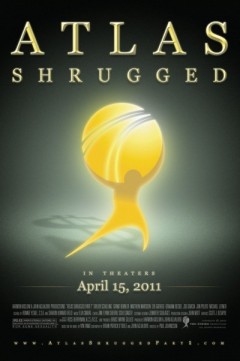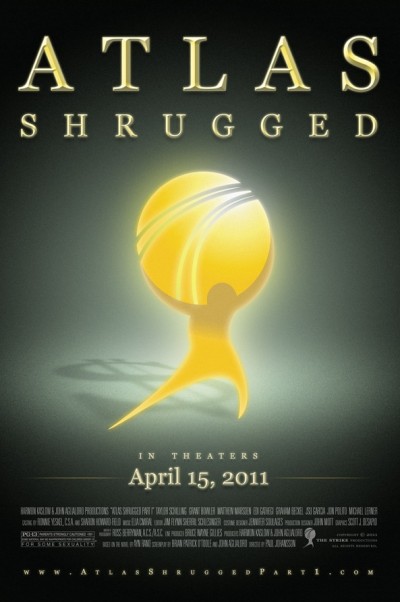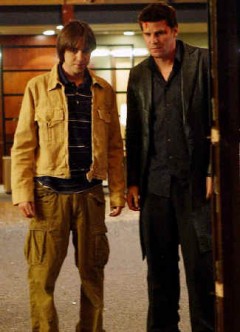
 In Ayn Rand’s novel Atlas Shrugged, the first time we meet Dagny Taggart is on the Taggart Comet. The scene comes alive as Rand’s pen reveals the details such that the reader feels as if he is there. When Dagny awakens from a nap to discover the train has stopped, she gets off to investigate. Ayn Rand writes:
In Ayn Rand’s novel Atlas Shrugged, the first time we meet Dagny Taggart is on the Taggart Comet. The scene comes alive as Rand’s pen reveals the details such that the reader feels as if he is there. When Dagny awakens from a nap to discover the train has stopped, she gets off to investigate. Ayn Rand writes:
There was a cold wind outside, and an empty stretch of land under an empty sky. She heard weeds rustling in the darkness. Far ahead, she saw figures of men standing by the engine—and above them, hanging detached in the sky, the red light of a signal.
I have often thought Rand would have made an excellent director, and in that single paragraph we can see some of her talent. She appeals to three senses and evokes compelling images in our heads. A director, location scout, sound engineer, set designer, and cinematographer intent on filming such a scene have half their work done for them already. Let us hear the weeds but not see them; let us see Dagny shiver once and hold her coat tighter to her body; let us see a long shot of silhouettes of men bathed in red light from the stoplight that seems to float in the dark sky above them. The appropriate shots present themselves, practically instructing the director.
Before the stop, Dagny hears a brakeman whistling a tune she just knows was composed by Richard Halley.
“Tell me please what are you whistling?”
…
“It’s the Halley Concerto,” he answered, smiling.
“Which one?”
“The Fifth.”
She let a moment pass before she said slowly and very carefully, “Richard Halley wrote only four concertos.”
The boy’s smile vanished… “Yes, of course,” he said. “I’m wrong. I made a mistake.”
This early scene, which I find excellent and a great mood setter for the rest of the book, is absent from the movie. So too is any trace of the talent for storytelling present in it.
[continue reading…]
Help Promote Prometheus Unbound by Sharing this Post
- From io9 comes this story of a supermodel brainwashed to work for the CIA:
In the movie Salt, Angelina Jolie plays a double-agent who is mind-controlled by scary remnants of the USSR secret service. And in real life, the 1940s bombshell Candy Jones was apparently brainwashed with drugs and used as a CIA covert operative. At least, according to testimony that Jones gave while under hypnosis, after her husband realized that she was acting strangely and seemed to have a split personality. Several years ago, the Fortean Times described what Jones reported while hypnotized: More »
- To critics of Ayn Rand’s Atlas Shrugged who sneeringly intone that her plot and villains are unrealistic, John Stossel observes:
Joe Biden Railroad
It’s amazing how modern politics resembles scenes of Ayn Rand’s best-seller Atlas Shrugged.
Like the one in which a high-ranking government official pumps millions of dollars into a failing railroad company. The grateful railroad CEO rewards the government official by renovating his hometown train station and naming it after the government official. The renovation costs $5,700,000 more than expected.
Then comes the ribbon cutting ceremony. The CEO gets on one of his trains to go to the ceremony, but it breaks down. No surprise there: One out of every four trains his company runs is late [pdf]. The CEO, chuckling at the irony, abandons the train and takes a car to the ceremony.
Unfortunately, that wasn’t a scene in Atlas Shrugged. It happened this weekend.
The government official is Joe Biden.
By the way, the first of three Atlas Shrugged movies opens next month, appropriately on April 15th.

Do you know of any other examples?
Help Promote Prometheus Unbound by Sharing this Post
Lots of news to catch up on with this post.
- Over a decade ago, a Russian paleontologist wrote an alternative take on the War of the Ring from J.R.R. Tolkien’s The Lord of the Rings. Recently translated into English, Kirill Yeskov’s The Last Ringbearer tells the tale from the point of view of Mordor, the bad guys in Tolkien’s epic.
History is usually written by the victors, but now the truth of the War of the Ring has finally come out. Gandalf is portrayed as a warmonger bent on destroying a bastion of civilization dedicated to reason, science, technology, and industrialization because science “destroys the harmony of the world and dries up the souls of men!” The elves are bent on world domination and Aragorn is a Machiavellian schemer whose strings are pulled by his wife, Arwen.
If you’re intrigued, you can learn more about The Last Ringbearer from the Salon.com article “Middle-Earth according to Mordor” and, also on Salon.com, the author’s own account of why he wrote the novel. You can download The Last Ringbearer for free and give it a read. Here’s to hoping Christopher Tolkien doesn’t aggress against Yeskov by launching a copyright or trademark infringement lawsuit.
- Finally, the print magazine, Analog Science Fiction and Fact, is entering the digital age and switching from snail mail to an electronic submissions system.
- In my previous news roundup, I posted the trailer of the upcoming movie adaptation of Ayn Rand’s Atlas Shrugged as well as some reports from people who had seen an advance preview and an interview with the producer. Here’s more footage, the scene in which Henry Rearden returns home and gives his wife a bracelet made from the first pouring of Rearden Metal:
[continue reading…]
Help Promote Prometheus Unbound by Sharing this Post
- The tv series Community recently had a funny episode devoted to Advanced Dungeons & Dragons. I started roleplaying when I was 12 with AD&D, roleplayed with a variety of games well into college, and have fond memories of it. I haven’t seen any other episodes in the series, so I don’t know if they’re worth watching. io9 has a good review of the D&D episode. Watch it for a limited time on Hulu.com.
- As if anti-gay marriage bigots and statists weren’t bad enough, now we can add anti-AI marriage luddites to the mix. Yes, folks, that slippery slope that gay marriage will surely start us down will lead us one day to marriage between humans and artificial intelligences! Um, yeah…so what? That alone won’t destroy traditional marriage any more than gay marriage will. I guess this guy hasn’t heard that Japanese nerds are already marrying their favorite anime game characters. No, I’m serious.
But anyway: The libertarian ideal, however one feels personally about gay and AI marriage, is for the state to get out of marriage entirely. Let people decide what to call their relationships and social evolution sort it out. Down with government classificationism!
Here’s io9 on the story. And here’s the biggotted luddite’s speech:
[continue reading…]
Help Promote Prometheus Unbound by Sharing this Post
In a new addition to the Mises Institute’s online media library today, part of The Libertarian Tradition podcast series, Jeff Riggenbach discusses libertarian science fiction.
Riggenbach discusses the role of science fiction in keeping individualism alive, the phenomenon of all the best known libertarian novels being science fiction novels, Eric S. Raymond’s “A Political History of SF” in which Raymond argues that science fiction has a natural affinity with libertarianism, and the importance of dramatizing our values (pdf).
Reviewed in some detail are A.E. van Vogt’s novel The Weapon Shops of Isher and Eric Frank Russell’s novel The Great Explosion.
Transcript.
Help Promote Prometheus Unbound by Sharing this Post

Great quote from Angel to his son Connor (Angel, Season 4, Episode 1, “Deep Down“):
Nothing in the world is the way it oughta be. It’s harsh…and cruel…but that’s why there’s us…champions. It doesn’t matter where we come from, what we’ve done, or suffered. Or even if we make a difference. We live as though the world were as it should be, to show it what it can be. You’re not a part of that yet. I hope you will be.
Reminds me of Ayn Rand’s “Anyone who fights for the future, lives it in today”1 and her conception of Romantic Realism in fiction as a portrayal of life “as it could be and should be.”2 See, also, my Journal of Libertarian Studies article, “Atlas Shrugged and the Importance of Dramatizing Our Values (pdf).”
Help Promote Prometheus Unbound by Sharing this Post


I’ve got some ideas about what would happen after the end of Atlas Shrugged. I could just describe the basic plot here for you. I could say, “I think that after the world economy crashes and the governments collapse, the heroes emerge and help to rebuild. Dagny and Galt have a child, who ends up being a Randian Kwisatz Haderach, named Sarah. Then they get divorced when Dagny cheats on Galt with Eddie Willers. Sarah ends up running for President of a scaled back federal government. And there are lots of interesting sub-plots, such as [x, y, z].”
I could use this technique to highlight how some of Rand’s ideas were flawed, in my view, or builds on or extends them into other areas.
But I thought actually writing it up in novel-form might be a different way to present these ideas. So I spent the last four years on this. The novel is a doozy — 450 pages of great literature. My friends who’ve seen it think it’s amazing.
But I could not publish it. Rand’s estate would surely sue me for copyright infringement.
[continue reading…]
Help Promote Prometheus Unbound by Sharing this Post
 In Ayn Rand’s novel Atlas Shrugged, the first time we meet Dagny Taggart is on the Taggart Comet. The scene comes alive as Rand’s pen reveals the details such that the reader feels as if he is there. When Dagny awakens from a nap to discover the train has stopped, she gets off to investigate. Ayn Rand writes:
In Ayn Rand’s novel Atlas Shrugged, the first time we meet Dagny Taggart is on the Taggart Comet. The scene comes alive as Rand’s pen reveals the details such that the reader feels as if he is there. When Dagny awakens from a nap to discover the train has stopped, she gets off to investigate. Ayn Rand writes:











